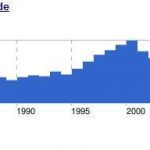2011
Caroline Levine argues that Jason Mittell's attempts to classify The Wire by genre results in "some slippery logic, some fruitful and provocative but not altogether persuasive argumentative moves in Mittell's own game." She suggests that examining the show through the lens of form - not genre - clarifies why it warrants comparisons with texts like Bleak House: both works attempt to represent the distinctly networked quality of urban social life.
Can Critical Code Studies overcome the divide between technology workers and technocultural theorists?
In the second installment of a six-week discussion, contributors search for examples of Critical Code Studies "in the wild." Instead of asking how code can be read critically, they examine how code is already being created and disputed by lawyers, programmers, and the general public.
Can the rising cost of cosmopolitan real estate have brought the New York City novel to a low point? Tom LeClair measures recent fictions from and about New York City - including three "9/11 novels" - against the Systems Novel of the mid-1970s.
David Lavery ponders the "neo-baroque" tap-dancing of TV's most playful and commercially successful serial drama.
Jason Mittell calls David Simon's bluff: to what degree is The Wire really like a "televised novel"? To what degree is it more like a video game? Why not classify it as what it really is - a genre-spawning "masterpiece" in the medium of television.
In this review of Robert Chodat's Worldly Acts and Sentient Things, Stephen Dougherty argues that Chodat's inquiry could have profited from a deeper engagement with posthumanist thought.
Stuart Moulthrop uses the lessons of hypertext as both an analogy and an explanation for why hypertext and its criticism will stay in a "niche" - and why, despite Bell's concern, that's not such a bad thing. As the response of an author to his critic, addressed to "thee," "implicitly dragging her into the niche with me," this review also dramatizes the very productivity of such specialized, nodal encounters.
David Shields is hungry, but not hungry enough. So says Curtis White, who argues that by ignoring anti-realism's past and present, Shields writes as if "New York" and "now" are the only contexts that matter.
2010
Stephen Burn connects Don DeLillo's fifteenth novel, Point Omega, with the author's long-running investigation into the structures of the mind. Using an elusive narrative architecture, images from a slowed-down film, and moments of second- and third-order observation, the novel dramatizes the mind's pre-conscious fiction-making processes.
D. Fox Harrell considers how a media theory of the "phantasmal" - mental image and ideological construction - can be used to cover gaps within electronic literary practice and criticism. His perspective is shaped by cognitive semantics and the approach to meaning-making known as "conceptual blending theory."
In this review-essay, James J. Pulizzi reads Joseph McElroy's 1977 novel, Plus, as a Bildungsroman for the posthuman: instead of tracing the development of a subject, the novel traces the development of processes that call the very idea of a subject into question. As a human brain adjusts to its new housing in an experimental satellite, the text unfolds in a series of re-entries and re-mappings, an unfolding that necessarily implicates the reader.
Minds bind - make coherent meaning from distributed processes - and narratives do, too. The means by which they do so remains a mystery, however. Kiki Benzon suggests that this mystery is at the heart of Mark Z. Danielewski's House of Leaves, a text whose layered structure, typographical blending, and central metaphor - a house much bigger than the sum of its parts - enact the problem of binding on multiple levels.
Excerpted from a forthcoming nonfiction book on water, Joseph McElroy's essay ponders (among other questions) the relationship between the physical waters of the world and brain and the phenomenal waters of the mind. "I meant to ask, 'What has water to say on the subject of us?" - i.e., on its own without prompting? Dumb question, it tells me."
John Bruni suggests that Cary Wolfe's new essay collection explores the various cognitive fictions of humanism and carves out a functional role for systems-influenced theory and art.
In this review of Cary Wolfe's new essay collection, What is Posthumanism?, Neil Badmington reflects on the ebb and flow of "the posthuman" and ponders what Wolfe's work suggests for the future of the field.
What does it mean to apply a "critical" lens to programming code? Members of the CCS Working Group grapple with this and other foundational questions, hashing out the methods, boundaries, and stakes of a new academic field. This essay is part of a series on Critical Code Studies distilled from a six week online discussion.
Timothy Morton offers a critical reading of Roderick Coover's video Canyonlands: Edward Abbey and the Defense of Wilderness. In the video's stark modernist form, Morton writes, "the hydroelectric engine of human progress still hums." What's needed now, he suggests, is a "Goth remix."
Daniel Worden's riposte to Sean O'Sullivan's piece on Deadwood argues that O'Sullivan's "formalist account does not acknowledge... Deadwood's connection to a kind of historical necessity that governs not just the show's characters but also the very structure of the show as a historical drama about the West on late twentieth-century cable."
Sean O'Sullivan explores numerous aspects of narrative and seriality in his examination of the HBO series Deadwood, created by David Milch. O'Sullivan argues that Deadwood often resists seriality's dictates and conventions by adhering to, amongst other structures, Aristotlelian dramatic principles that are by nature at odds with seriality's essence. This is but one example of the existence of an "internal constriction" that "pushes against some of the conventions of television serials by denying...



